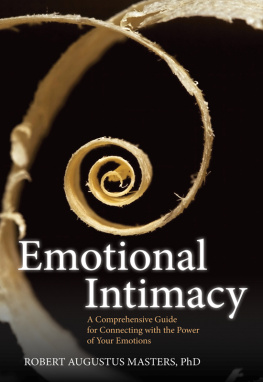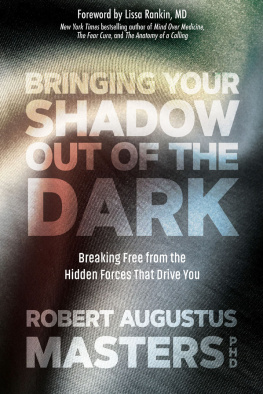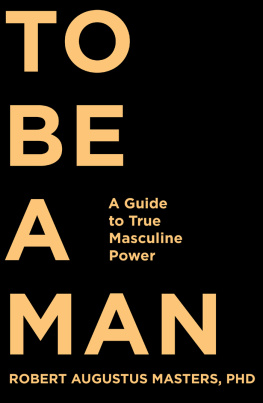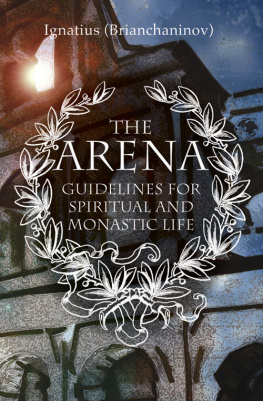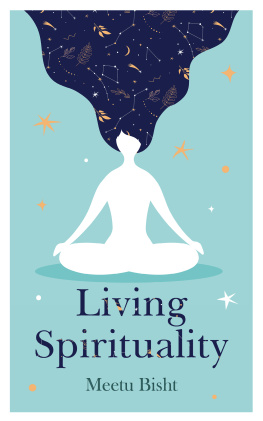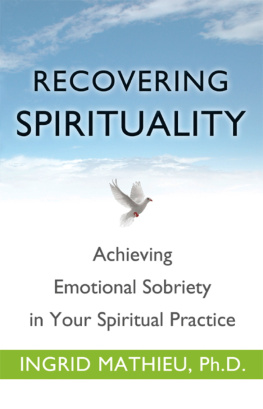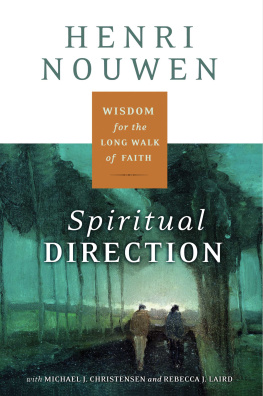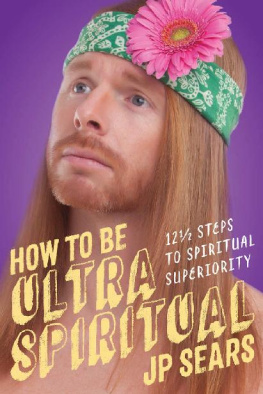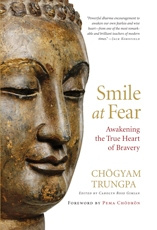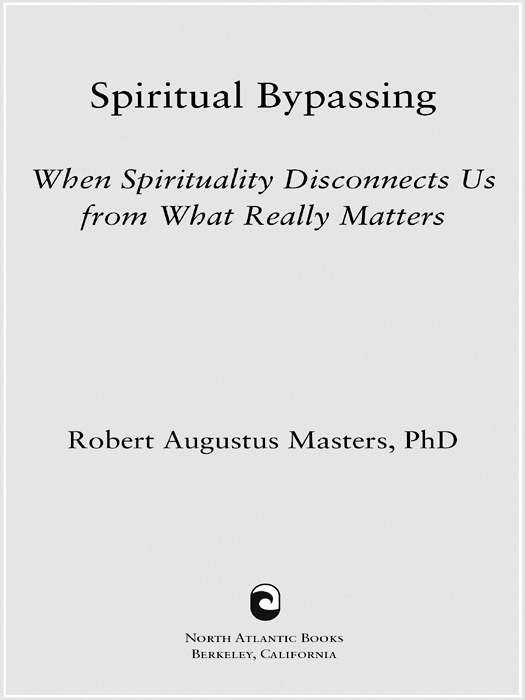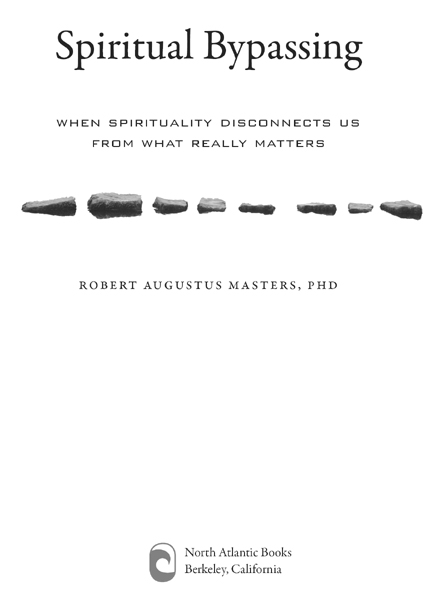ADDITIONAL PRAISE FOR SPIRITUAL BYPASSING
In Spiritual Bypassing, Robert Augustus Masters offers a wake-up callmore of a shoutto those of us who have unwittingly fallen prey to all manner of promising and seductive antidotes to our pain and suffering in the form of detached spiritual teachings and New Age magical thinking. The book is a sobering and powerful reminder that our present embodiment, in all its flawed, messy humanness, cannot be conveniently sidestepped, and so invites us inward to a face-to-face encounter and embrace with the raw truth of who we really are. Masters unique and at times disarming prose style blends a poetic sensibility with a surprising stark clarity that points us to What Really Matters.
Eliezer Sobel, author of The 99th Monkey: A Spiritual Journalists Misadventures with Gurus, Messiahs, Sex, Psychedelics, and Other Consciousness-Raising Experiments
Traversing the muddy waters of contemporary spirituality requires a willingness to meet its seen and unseen challenges with ruthless self-honesty and keen discernment. Masters addresses the many faces of spiritual bypassing with intellectual rigor, hard-earned insight, and emotional intelligence. It is a lucid, well-written, and practical guide for both new and seasoned practitioners on the spiritual path.
Mariana Caplan, PhD, author of Eyes Wide Open: Cultivating Discernment on the Spiritual Path and Halfway Up the Mountain: the Error of Premature Claims to Enlightenment
In Spiritual Bypassing, Robert Masters eloquently reminds us of something we have unknowingly misplaced on our spiritual journeys: Mother Earth. In our efforts to bypass our earthly challenges, we have disconnected from the Ground of our very being, seeking our wholeness on a pogo stick to the stars. In poignant and clarifying language, Masters calls us back home, confronting us with our avoidance, inviting us to find our spirituality in the heart/depths of our humanness. In an era where detachment models for spirituality are becoming dangerously prevalent, his inclusive message is of profound importance. It may not appeal to the part of us that wants the path to be easy, but it will speak loudly to the part of us that longs for the truth. I recommend it wholeheartedly.
Jeff Brown, author of Soulshaping
Robert Masters has given us a great gifta tremendously useful guide to examining our tendencies to spiritual bypassing, clearly the most comprehensive and accessible treatment available on this crucial topic. His work is a great contribution to the ongoing integration of psychotherapy and spiritual practice, and to our understanding of the meaning of spiritual maturity.
Donald Rothberg, PhD, author of The Engaged Spiritual Life
There is much hard-won wisdom in this work. Spiritual Bypassing is a detailed, point-by-point description of how so-called spirituality can be used by some to actually avoid individuation, adulthood, and the daimonic. When Carl Jung noted that neurosis is always a substitute for legitimate suffering, he hinted that, especially for the Western psyche, spiritual practice itself can be just such a sneaky neurosis. This insightful, firm, confrontive yet compassionate book promotes and encourages the complementary marriage of spiritual practice and psychotherapy, recognizing that they areand, at best, have always beenbasically two integrally related sides of the same existential coin: The most profound psychotherapy is essentially spiritual; and the deepest spiritual quest includes some depth psychology. Neither approach can be excluded on the unpredictable path toward selfhood.
Stephen Diamond, PhD, author of Anger, Madness, and the Daimonic: The Psychological Genesis of Violence, Evil, and Creativity
Uncompromising and truth-telling, this book is an antidote to spiritual obesity. What emerges is the call to psychological clarity as essential to the mature spiritual life. Here is soul-fuel for those who would enter the road less traveledthe deeply examined life as part of spiritual practice.
Jean Houston, PhD, author of A Mythic Life
ALSO BY ROBERT AUGUSTUS MASTERS
Darkness Shining Wild: An Odyssey to the Heart of Hell & Beyond Meditations on Sanity, Suffering, Spirituality & Liberation
Freedom Doesnt Mind Its Chains: Revisioning Sex, Body, Emotion & Spirituality
The Anatomy & Evolution of Anger: An Integral Exploration
Divine Dynamite: Entering Awakenings Heartland (revised edition)
Transformation Through Intimacy: The Journey Toward Mature Monogamy
Meeting The Dragon: Ending Our Suffering by Entering Our Pain
For all those whose longing to be truly free is becoming stronger
than their desire to distract themselves from suffering
CONTENTS
APPENDIX I
The Method of No Method:
Intuitive Integral Psychotherapy
APPENDIX II
Illuminating and Integrating Body, Mind, Emotion, and Spirituality
1

AVOIDANCE IN HOLY DRAG
An Introduction to Spiritual Bypassing
Spiritual bypassing, a term first coined by psychologist John Welwood in 1984, is the use of spiritual practices and beliefs to avoid dealing with our painful feelings, unresolved wounds, and developmental needs. It is much more common than we might think and, in fact, is so pervasive as to go largely unnoticed, except in its more obvious extremes.
Part of the reason for this is that we tend not to have very much tolerance, either personally or collectively, for facing, entering, and working through our pain, strongly preferring pain-numbing solutions, regardless of how much suffering such remedies may catalyze. Because this preference has so deeply and thoroughly infiltrated our culture that it has become all but normalized, spiritual bypassing fits almost seamlessly into our collective habit of turning away from what is painful, as a kind of higher analgesic with seemingly minimal side effects. It is a spiritualized strategy not only for avoiding pain but also for legitimizing such avoidance, in ways ranging from the blatantly obvious to the extremely subtle.
Spiritual bypassing is a very persistent shadow of spirituality, manifesting in many forms, often without being acknowledged as such. Aspects of spiritual bypassing include exaggerated detachment, emotional numbing and repression, overemphasis on the positive, anger-phobia, blind or overly tolerant compassion, weak or too porous boundaries, lopsided development (cognitive intelligence often being far ahead of emotional and moral intelligence), debilitating judgment about ones negativity or shadow side, devaluation of the personal relative to the spiritual, and delusions of having arrived at a higher level of being.
The explosion of interest in spirituality since the mid-1960s, especially Eastern spirituality, has been accompanied by a corresponding interest and immersion in spiritual bypassingwhich has, however, not very often been named, let alone viewed, as such. It has been easier to frame spiritual bypassing as a religion-transcending, spiritually advanced practice or perspective, especially in the fast-food spirituality epitomized by faddish phenomena like


